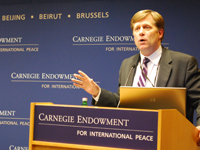Registration
You will receive an email confirming your registration.
The agenda for U.S.-Russia cooperation has broadened substantially since the “reset” of their relations was announced in 2009. A critical component of the reset, the Bilateral Presidential Commission facilitates engagement among government, business, and civil society actors on topics ranging from nuclear energy to public health, with high-profile cooperation on top national security priorities for both sides. Michael McFaul, senior director for Russian and Central Asian affairs at the National Security Council (NSC), spoke at Carnegie about how Moscow and Washington can sustain the positive momentum in their bilateral relationship and strengthen the foundation for cooperation.
Context of the Reset
When President Obama was inaugurated in 2009, he inherited a tense relationship with Russia, McFaul recounted. The United States and Russia viewed conflict between the two nations as part of a zero-sum game. Tensions existed between Moscow and Washington, defined by a variety of issues, including the 2006 disputes with Ukraine over gas pricing, Russia’s 2007-2008 cyber-interference in Estonia and Georgia, and the Russo-Georgian war in 2008. Simultaneously, democracy continued to suffer setbacks.
With this background, the Obama NSC team took a close look at U.S. security priorities, both regionally and globally. They identified commonalities with Russia, which could build a foundation for cooperation. As a result, McFaul said, the Obama administration initiated a “reset” of relations with Moscow based on determining U.S. interests where these interests appeared shaped by Russia.
Principles of the Reset
- Common U.S.-Russian Interests: A number of core U.S. interests, which are also prominent Russian concerns, existed prior to the reset, McFaul said.
- Not Zero-sum: Engagement with Russia can produce win-win outcomes, McFaul asserted. Nonetheless, he acknowledged that tension occurs at times over which nation is perceived to gain more from particular instances of bilateral engagement.
- Multidimensionality: Establishing the reset required developing a bilateral relationship that spanned a number of issues, from counterterrorism to energy security. The Obama administration wanted a relationship that allowed for discussion of numerous issues at once, rejecting the premise that Washington would have to compromise on one issue to enable progress on another, McFaul explained.
- Promote Universal Values: The reset uses dual-track engagement with both the Russian government and civil society to promote core U.S. interests, including respect for the rule of law. The Bilateral Presidential Commission, with its seventeen working groups, has helped both countries discuss issues of concern.
- Government and Civil Society: Some critics of the reset have argued that meeting with members of the Russian government confers legitimacy on a regime that is not democratic. McFaul acknowledged those concerns, explaining that when members of the Obama administration visit Russia, they meet not only with their counterparts in the Kremlin, but also with members of Russian civil society, particularly dissident parties.
Evaluating Progress
While the reset has seen several major successes, McFaul noted that much work remains to be done. He highlighted recent achievements of the reset, such as maintaining the Manas Transit Center in the Northern Distribution Network, signing the New START Treaty, and Russia’s cancellation of a missile defense deal with Iran. McFaul then presented an agenda for 2011:
- WTO: The United States should help speed Russian accession to the WTO, a process that is moving much faster than anticipated. The main obstacle to Russian accession now is the Georgia’s objections. McFaul said that he expects accession to occur in the spring of 2011.
- Jackson-Vanik: Although largely a symbolic measure, a repeal of the Jackson-Vanik amendment of 1974 by Congress will reaffirm the improving dynamic between the two countries, McFaul said. He expressed his belief that debate on Jackson-Vanik will serve as a referendum on the changing U.S.-Russian relationship.
- Missile Defense Cooperation: U.S.-Russian cooperative missile defense cooperation would enhance both nations’ security, McFaul asserted.
- Conventional Armed Forces in Europe (CFE) Treaty: The United States seeks to move forward with negotiations on a broader level to resuscitate the CFE Treaty. The treaty was initially tasked with substantially reducing the likelihood of a surprise attack by either a NATO or Warsaw Pact country which could escalate into a devastating war in Europe. Its role has since evolved and the treaty continues to be referred to as the ‘cornerstone of European security,’ McFaul said. Accordingly, the United States and several of the other 30 parties to the treaty have sought to restore compliance after Russia’s ‘suspension’ of the treaty in December of 2007. Ambassador Victoria Nuland, whom Secretary of State Hillary Clinton named as special envoy for CFE in February of 2010, has done well in her efforts to reinvigorate the process, he said.
- Conflicts in the Caucasus: The United States seeks to ameliorate tensions and defuse regional conflicts such as tensions surrounding South Ossetia and Nagorno-Karabakh.
- Modernization: In 2011, the Obama administration will continue to exert pressure on Russian political and economic institutions to work toward modernization and reduce corruption.
McFaul explained that the administration believes progress in bilateral relations requires maintaining realistic expectations. Keeping expectations aligned with what the relationship can manage is essential to its future success, he concluded.
